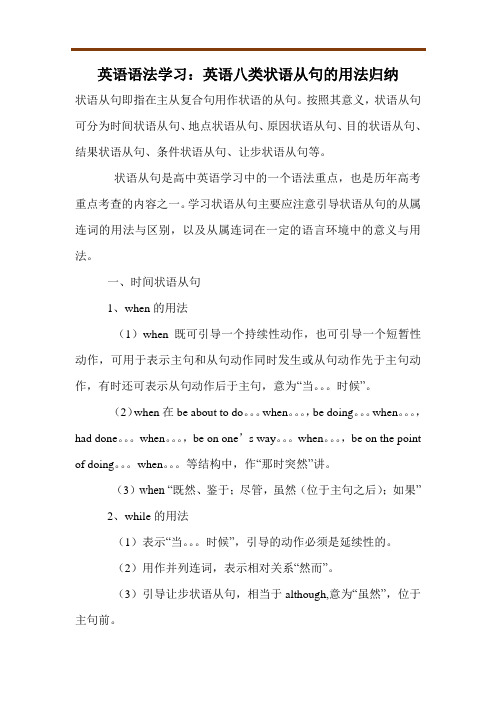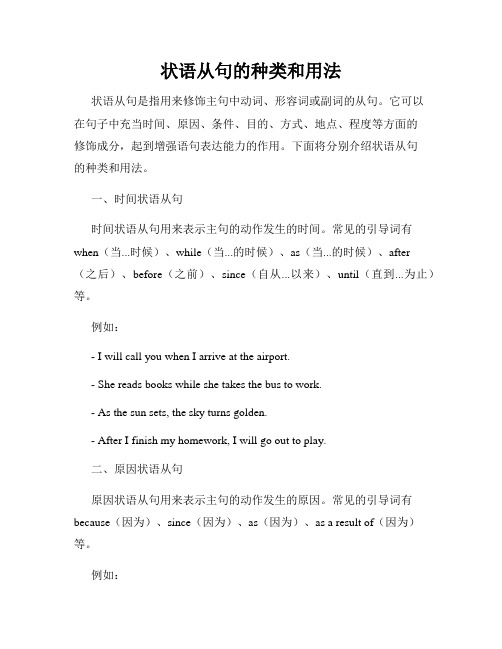状语从句八大类型教学文案
状语从句的分类与使用技巧

状语从句的分类与使用技巧状语从句是句子中充当状语的从句,通过修饰主句的谓语动词、形容词或副词,增强句子的表达效果,使语句更加丰富多样。
在英语写作中,灵活运用状语从句可以提升文章的流畅度和表达能力。
本文将介绍状语从句的分类和使用技巧。
一、状语从句的分类状语从句可以根据其所表达的具体含义分为时间状语从句、地点状语从句、原因状语从句、条件状语从句和结果状语从句等。
1. 时间状语从句时间状语从句用来表示主句的动作发生的时间。
常见的引导词有when(当)、while(当……的时候)、before(在……之前)、after (在……之后)等。
例如:- I will go to bed when I finish my homework.(当我完成作业时,我会去睡觉。
)- He always listens to music while he is jogging.(他跑步时总是听音乐。
)2. 地点状语从句地点状语从句用来表示主句的动作发生的地点。
常见的引导词有where(在哪里)、wherever(无论在哪里)等。
例如:- She will meet you where we agreed.(她会在我们约定的地方和你见面。
)- You can go wherever you like.(你可以去你喜欢的地方。
)3. 原因状语从句原因状语从句用来表示主句发生的原因。
常见的引导词有because (因为)、since(因为)、as(因为)等。
例如:- I couldn't go to the party because I was sick.(我因为生病不能去参加派对。
)- Since it's raining, we should stay at home.(因为下雨了,我们应该呆在家里。
)4. 条件状语从句条件状语从句用来表示主句发生的条件。
常见的引导词有if(如果)、unless(除非)等。
状语从句全类型讲解教案

状语从句全类型讲解教案一、引言。
状语从句是复合句的一种,用来修饰主句,表示时间、原因、条件、让步、目的等不同的关系。
状语从句的类型有很多,包括时间状语从句、原因状语从句、条件状语从句、让步状语从句、目的状语从句等。
掌握状语从句的不同类型对于提高写作和阅读能力非常重要。
本教案将全面讲解状语从句的各种类型,帮助学生更好地掌握状语从句的用法。
二、时间状语从句。
时间状语从句用来表示主句发生的时间,常见的引导词有when, while, as, before, after, since, until等。
例如:When I was young, I used to play basketball every day.After she finished her homework, she went to bed.时间状语从句表示的时间可以是过去、现在或将来,根据主句的时态来确定。
需要注意的是,如果主句是一般现在时,时间状语从句通常使用一般过去时表示过去的动作或状态;如果主句是一般过去时,时间状语从句通常使用过去完成时表示更早的过去。
三、原因状语从句。
原因状语从句用来表示主句发生的原因,常见的引导词有because, since, as, for, now that等。
例如:Because it was raining, we stayed at home.Since she was tired, she went to bed early.原因状语从句表示的原因可以是客观原因或主观原因,需要根据具体语境来确定。
需要注意的是,原因状语从句通常放在主句之前,用逗号隔开时则可以放在主句之后。
四、条件状语从句。
条件状语从句用来表示主句发生的条件,常见的引导词有if, unless, provided that, on condition that等。
例如:If it rains tomorrow, we will stay at home.Provided that you finish your homework, you can go outto play.条件状语从句表示的条件可以是真实的、非真实的或虚拟的,需要根据具体语境来确定。
英语语法学习:英语八类状语从句的用法归纳

英语语法学习:英语八类状语从句的用法归纳状语从句即指在主从复合句用作状语的从句。
按照其意义,状语从句可分为时间状语从句、地点状语从句、原因状语从句、目的状语从句、结果状语从句、条件状语从句、让步状语从句等。
状语从句是高中英语学习中的一个语法重点,也是历年高考重点考查的内容之一。
学习状语从句主要应注意引导状语从句的从属连词的用法与区别,以及从属连词在一定的语言环境中的意义与用法。
一、时间状语从句1、when的用法(1)when既可引导一个持续性动作,也可引导一个短暂性动作,可用于表示主句和从句动作同时发生或从句动作先于主句动作,有时还可表示从句动作后于主句,意为“当。
时候”。
(2)when在be about to do。
when。
,be doing。
when。
,had done。
when。
,be on one’s way。
when。
,be on the point of doing。
when。
等结构中,作“那时突然”讲。
(3)when “既然、鉴于;尽管,虽然(位于主句之后);如果”2、while的用法(1)表示“当。
时候”,引导的动作必须是延续性的。
(2)用作并列连词,表示相对关系“然而”。
(3)引导让步状语从句,相当于although,意为“虽然”,位于主句前。
(4)引导条件状语从句,相当于as/so long as,意为“只要”。
3、as 的用法(1)表示“当。
时候”,强调同时发生,不指先后。
(2)说明两种正在发展或变化的情况,表示“随着”,表示时间的推移。
(3)表示“一边。
一边。
”。
(4)强调两个动作紧接着发生。
(5)表示“虽然,尽管”。
(6)其他含义“正如,正像”,“作为”,“由于,因为”。
4、before的用法(1)一般意为“在。
之前”“。
才”,“。
就”“还没有。
”“免得”“不知不觉”“宁可,宁愿”,“否则,要不然”。
(2)It + will be/was + 时间段+before+一般现在时/一般过去时。
高中英语状语从句用法专题教案

高中英语状语从句用法专题教案高中英语状语从句用法详细解析一、定义:在句中作状语的从句是状语从句,修饰主句中的动词、形容词或副词等。
状语从句由从属连词引导,从属连词在句中不充当句子成分,只起连接作用,状语从句放在句首时,要用逗号,放在句尾时不用。
二、分类根据意义上的不同,状语从句可分为:①时间状语从句②地点状语从句③原因状语从句④目的状语从句⑤条件状语从句⑥结果状语从句⑦让步状语从句⑧方式状语从句⑨比较状语从句三、时间状语从句(一引导时间状语从句的连词有:as,when(whenever,before,after,as soon as,until(till,since,ever y time,once.(二、“as”as,when,while都有“当……的时候”,可以互用When she was a child.While she was a child.She Lived in Paris.As she was a child.as有“一边…一边”的意思He sang as he walked.“when”When the clock struck twelve,all the lights went out.I was sleeping when she came in.动补When we arrived at the station,the train had left.“while”主、从句动作或状态同时发生。
用while引导的从句用延续性动词,常表示较长的时间或一个过程。
While we were having supper,all the lights went out.Please keep quiet while others are studying.While I was writing letters last night,he was watching TV.when,while并列连问。
状语从句的种类和用法

状语从句的种类和用法状语从句是指用来修饰主句中动词、形容词或副词的从句。
它可以在句子中充当时间、原因、条件、目的、方式、地点、程度等方面的修饰成分,起到增强语句表达能力的作用。
下面将分别介绍状语从句的种类和用法。
一、时间状语从句时间状语从句用来表示主句的动作发生的时间。
常见的引导词有when(当...时候)、while(当...的时候)、as(当...的时候)、after(之后)、before(之前)、since(自从...以来)、until(直到...为止)等。
例如:- I will call you when I arrive at the airport.- She reads books while she takes the bus to work.- As the sun sets, the sky turns golden.- After I finish my homework, I will go out to play.二、原因状语从句原因状语从句用来表示主句的动作发生的原因。
常见的引导词有because(因为)、since(因为)、as(因为)、as a result of(因为)等。
例如:- I cannot go to the party because I have to work.- Since it is raining, we will stay indoors.- He failed the exam, as he didn't study enough.- She was late as a result of heavy traffic.三、条件状语从句条件状语从句用来表示主句的动作发生的条件。
常见的引导词有if (如果)、unless(除非)、provided that(只要)、as long as(只要)等。
例如:- If it rains tomorrow, we will cancel the picnic.- Unless you apologize, I will not forgive you.- You can go to the party provided that you finish your homework.- I will lend you my car as long as you promise to drive safely.四、目的状语从句目的状语从句用来表示主句的动作的目的或意图。
八类状语从句详解

英语八类状语从句的用法归纳一、概说状语从句即指在主从复合句用作状语的从句。
按照其意义,状语从句可分为时间状语从句、地点状语从句、原因状语从句、目的状语从句、结果状语从句、条件状语从句、让步状语从句等。
状语从句是高中英语学习中的一个语法重点,也是历年高考重点考查的内容之一。
学习状语从句主要应注意引导状语从句的从属连词的用法与区别,以及从属连词在一定的语言环境中的意义与用法。
二、时间状语从句1.引导时间状语从句的从属连词很多,常见的有before, after, when, while, as, since, till, until, as soon as 等。
2.表示“当…时候”的while, when, as 的用法区别是:while从句中的谓语动词必须是延续性动词;表示带有规律性的“每当”或当主、从句谓语动词的动作发生有先后时,只能用when;当表示“一边…一边…”或“随着”时,只能用as。
另外,用于此义的as 所引导的时间状语从句谓语只能是动作动词,不能是状态动词。
如下面一道高考题的答案是 B 而不能是A:“I’m going to the post office.”“_____ you’re there, can you get me some stamps?”A. AsB. WhileC. BecauseD. If3.until 在肯定句中通常只连用延续性动词,表示相应动作结束的时间;在否定句中通常连用非延续性动词,表示相应动作开始的时间,意为“直到…才”。
如:He waited until she was about to leave. 他等着一直到她准备离开。
I did not begin to work till he had gone. 他走了后我才开始工作。
4.表示“一…就”除用as soon as 外,还可用the minute, the second, the instant, immediately, directly, instantly, no sooner…than, hardly…when 等。
状语从句的种类与用法总结
状语从句的种类与用法总结状语从句是在复合句中,作为主句中的一个成分,用来修饰或限制主句的动词、形容词、副词等成分。
状语从句分为时间状语从句、原因状语从句、条件状语从句、目的状语从句、结果状语从句、让步状语从句等几种类型。
下面将对这些状语从句的特点和用法进行总结。
1. 时间状语从句时间状语从句用来表示动作发生的时间,可以分为过去、现在和将来几个方面。
常见的引导词有when, while, as, before, after, since, until 等。
例如:- I will go to bed after I finish my homework.(当我完成作业之后,我会去睡觉。
)- She always looks happy when she sees her friends.(当她见到她的朋友时,她总是看起来很开心。
)2. 原因状语从句原因状语从句用来表示动作的原因,常见的引导词有because, since, as等。
例如:- He didn't attend the meeting because he was sick.(因为他生病了,所以他没有参加会议。
)- Since it is raining outside, we should bring an umbrella.(因为外面在下雨,所以我们应该带把伞。
)3. 条件状语从句条件状语从句用来表示某种条件下会发生的情况,常见的引导词有if, unless, provided that等。
例如:- If it rains tomorrow, we will stay at home.(如果明天下雨,我们会呆在家里。
)- You can go out unless it is too hot.(除非天气太热,你可以出去。
)4. 目的状语从句目的状语从句用来表示主句的动作是为了实现从句中的目的,常见的引导词有so that, in order that等。
状语从句的种类及其在句子中的位置
状语从句的种类及其在句子中的位置状语从句是英语中常见的从句类型之一。
它在句子中用来修饰动词、形容词、副词等,起到更加具体和详细的说明和补充的作用。
本文将介绍状语从句的种类及其在句子中的位置。
一、状语从句的种类1. 时间状语从句时间状语从句用来表示动作或事件发生的时间、顺序、频率等。
常见的引导词有when(当...时候)、while(当...的时候)、as(当...时候)等。
例如:- I will go to bed when I finish the report.(我完成报告时,就去睡觉。
)- While she was cooking, her phone rang.(她在煮饭时,手机响了。
)- As I was leaving, it started to rain.(当我离开时,开始下雨了。
)2. 地点状语从句地点状语从句用来表示动作或事件发生的地点。
常见的引导词有where(在哪里)、wherever(无论在哪里)等。
例如:- He will meet you where we first met.(他会在我们初次见面的地方和你见面。
)- Wherever you go, I will follow.(无论你去哪里,我都会跟随。
)原因状语从句用来表示动作或事件发生的原因。
常见的引导词有because(因为)、since(因为)、as(因为)等。
例如:- He didn't come to the party because he was sick.(他因为生病所以没有来参加派对。
)- Since it's raining, we should stay at home.(因为下雨了,我们应该待在家里。
)4. 目的状语从句目的状语从句用来表示动作或事件的目的。
常见的引导词有so that (以便)、in order that(为了)等。
例如:- I study hard so that I can pass the exam.(我努力学习,以便能通过考试。
状语从句(基础版)教学文案
while:持续性动词 /进行时
e.g. I like listening to music while I am doing my homework.
例句:我会待在这里,直到你回来为止。
I’ll stay here until you come back.
◆当主句谓语动词是非延续性动词时, 主句常用否定形式。 not… until…“直到……才……” 例句:他直到做完作业才睡觉。
He didn’t go to bed until he finished his homework.
We’ll come over to see you on Saturday if we have time. We should serve the people as / so long as we live.
1. We will be able to get there on time, ____ our car
whenever
• 表:每当… • Whenever we are in trouble, he will come to help
us.
• Whenever you say “I’m sorry”, look the person right in the eyes.
• Smile whenever you pick up the phone.
doesn’t break down on the road.
A. as soon as
B. as far asB.C as long asD. as well as
初中状语从句专题教案
初中状语从句专题教案
一、教学目标:
1. 让学生掌握状语从句的定义和基本用法。
2. 使学生能够识别和运用不同类型的状语从句。
3. 培养学生运用状语从句进行有效表达的能力。
二、教学内容:
1. 状语从句的定义和分类。
2. 状语从句的连接词。
3. 状语从句的运用实例。
三、教学重点与难点:
1. 状语从句的连接词及其用法。
2. 不同类型状语从句的运用。
四、教学过程:
1. 导入:通过一个句子让学生猜测缺少的部分,从而引出状语从句的概念。
2. 新课讲解:
(1)状语从句的定义:状语从句是句子的一部分,用来修饰主句,表示时间、地点、原因、条件等。
(2)状语从句的分类:时间状语从句、地点状语从句、原因状语从句、条件状语从句等。
(3)状语从句的连接词:例如:when(当……时)、where(在哪里)、because(因为)、if(如果)等。
3. 实例分析:分析一些含有状语从句的句子,让学生理解状语从句的用法。
4. 练习环节:让学生分组练习,编写含有不同类型状语从句的句子。
5. 课堂小结:总结本节课所学内容,强调状语从句的连接词及其用法。
6. 作业布置:让学生课后编写一个含有状语从句的句子,并写在日记中。
五、教学反思:
本节课通过讲解和练习,使学生掌握了状语从句的基本概念和用法。
在教学过程中,要注意引导学生正确使用状语从句的连接词,并能够识别不同类型的状语从句。
同时,通过实例分析和练习,让学生在实际语境中运用状语从句,提高他们的语言表达能力。
- 1、下载文档前请自行甄别文档内容的完整性,平台不提供额外的编辑、内容补充、找答案等附加服务。
- 2、"仅部分预览"的文档,不可在线预览部分如存在完整性等问题,可反馈申请退款(可完整预览的文档不适用该条件!)。
- 3、如文档侵犯您的权益,请联系客服反馈,我们会尽快为您处理(人工客服工作时间:9:00-18:30)。
1.时间状语从句(adverbial clauses of time),多由连词引起。
(when,after,before,as,as soon as,as long as,since,whenever,once)E.g. When we lived in town we often went to the theater.It was a long time before I got to sleep again.As the sun rose the fog dispersed(vt. 消散).少数不由连词引起状语从句。
(now that,every time,each time,the moment,immediately,instantly,directly)E.g. Directly he uttered(vt. 说出)these words, there eas a dead silence.I had no sooner checked in the hotel than he arrived.2.地点状语从句(adverbial clause of place)(where,wherever,anywhere)E.g. The church was built where there had once been a roman temple(n.寺庙).Everywhere I go, I find the same thing.3.方式状语从句(adverbial clause of manner),一般由as,like,as if引起。
E.g. I am as you can image short of money. 正如你能想象的那样,我很缺钱。
I did as she asked.Do it as he does.I feel just like I did when I was a boy.I remember the whole thing as if it happened yesterday.He glanced about as if in search of something.4.原因状语从句(adverbial clause of reason), 一般由because,as,since,in case,还有两个词有相同的意思(seeing,considering)E.g. He was angry because we were late.As the soup was very salty, we were thirsty afterwards.He took a spoonful(n.满满的一勺) and tasted it in case it was hot.Seeing that it is ten o’clock, we shall not wait for her any longer.5.条件状语从句,一般由if,unless,supposing, providing,as long as, granted that 引起。
E.g. We sat on the gras s if it was fine.If I could afford it, I would buy a boat.If necessary, ring me at home.Supposing he can’t come, who will do the work?6.让步状语从句(adverbial clause of concession),主要由although, though, even though, while,whereas。
E.g. Though we are poor, we are still happy.Some praise him, whereas others condemn him.Though not large, the room was well lit.7.目的状语从句和结果状语从句(adverbial clause of purpose and adverbial clause of result),主要由so that,such that, in order that,otherwise,else.E.g. Let’s take the front seats that we may see more clearly.Give me back the money, otherwis e I’ll ring the police.Hurry up or else you’ll be late.(赶快,否则你就会迟到了。
)8.比较状语从句(adverbial clauses of comparison),主要由than ,as 引起。
E.g. You sing bette r than I do.I haven’t done as much as I should have liked.(我没做得像我希望的那样好。
)一. 单项填空1. _______ he’s old, he can still carry this heavy bag.A. ThoughB. SinceC. ForD. So2. ---Do you know if he _______ to play basket ball with us?---I think he will come if he ______ free tomorrow.A. comes; isB. comes; will beC. will come; isD. will come; will be3. In the zoo if a child _____ into the wate r and can’t swim, the dolphins may come up ______ him.A. will fall; to helpB. falls; to helpC. will fall; helpD. falls; helping4. I don’t remember ________ he worked in that city when he was young.A. whatB. whichC. whereD. who5. We will stay at home if my aunt ________ to visit us tomorrow.A. comesB. comeC. will comeD. is coming6. The police asked the children _______ cross the street ________ the traffic lights turned green.A. not; beforeB. don’t; whenC. not to; unt ilD. not; after7. I was late for class yesterday _______ there was something wrong with my bike.A. whenB. thatC. untilD. because8. I’ll go swimming with you if I ________ free tomorrow.A. will beB. shall beC. amD. was9. In the exam, the ________ you are, ______ the _______ mistakes you will make.A. careful; littleB. more careful; fewestC. more careful; fewerD. more careful; less10. You should finish your lessons _______ you go out to play.A. beforeB. afterC. whenD. while11. I hurried _____ I wouldn’t be late for class.A. sinceB. so thatC. as ifD. unless12. When you read the book, you’d better make a mark _______ you have any questions.A. whichB. thatC. whereD. though13. The teacher raised his voice _______ all the students could hear him.A. forB. so thatC. becauseD. in order14. He took off his coat _______ he felt hot.A. becauseB. asC. ifD. since15. It is ______ that we’d like to go out for a walk.A. a lovely dayB. too lovely a dayC. so lovely a dayD. such lovely a day16. Mary had ______ much work to do that she stayed at her office all day.A. suchB. soC. tooD. very17. _______ I felt very tired, I tried to finish the work.A. AlthoughB. BecauseC. AsD. As if1.A2.C3.B4.C5.A6.C7.D8.C9.C 10.A11.B 12.C 13.B 14.A 15.C 16.B 17.A。
